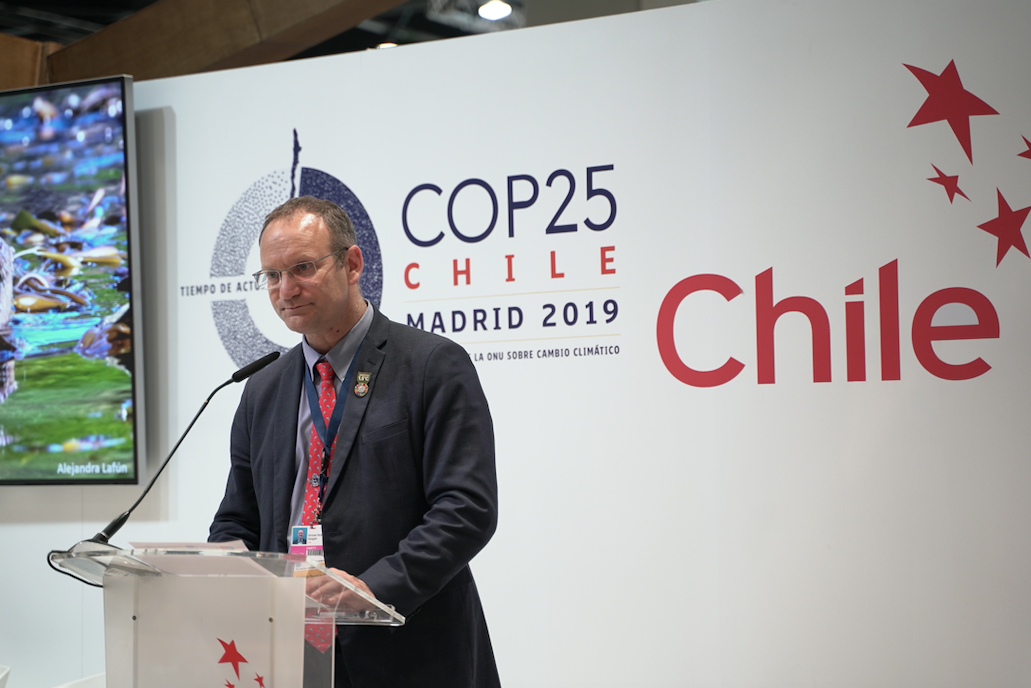By Tatiana Márquez, in Madrid
“These few days are a chance for us to build sturdy pillars and bridges for collaboration at a critical time for the world’s oceans. We have many issues to resolve, in both marine and land-based biodiversity”, said Gonzalo Muñoz, High Level Climate Champion at the COP25, who took part in the ‘Global Climate Action in Marine Protected Areas’ panel at the Chile pavilion on the sixth day of the summit.
“I am heavily critical of everything that needs to be changed. We have to respect not only these bodies of water, but also the species and microorganisms that live in them. They are vital for our food chain and ecosystems”. Muñoz highlighted the damage produced by microplastics that, by mistake, are often ingested by fish, birds and other animals. “We aren’t doing enough. We have to switch to more sustainable practices and systems that are supported by responsible green energy”.
This line of thought reflects the sentiments of the experts on yesterday’s ‘Maritime Traffic, Oceans and Biodiversity’ panel that was organized by the Filantropía Cortés Solari (FCS) group through Fundación MERI. The panel discussed the importance of conserving the seas and oceans and the plants and animals that live in them. A key point made was that forests should no longer be considered the world’s only lungs, as the oceans actually surpass them in terms of oxygen production thanks to their sheer scale. Furthermore, the experts highlighted the role of cetaceans in climate change mitigation, especially whales.
Sonia Español-Jiménez, a leading cetacean researcher for Fundación MERI, proposed that whales can be “a natural solution to climate change, as they absorb carbon from the waters around them and play a key role in oxygenating and fertilizing marine ecosystems and the food chain”. Their role is so important that Español-Jiménez claimed that “saving the whales is saving ourselves”. The researcher also spoke of the many threats facing marine animals, especially that of maritime traffic. Whales usually only raise one or two calves in their lifetime, meaning each individual is invaluable. “As the COP25 slogan says, it’s time for action. We have evidence, so please, let’s do something”, she said.
Ralph Chami, a representative of the International Monetary Fund (IMF) explained the function of his organization: “At the IMF, it’s our job to turn scientific information into economics. We weigh up the costs and then break them down for governments and society in general”. “Whales act as carbon sponges and help to fertilize phytoplankton, which in turn oxygenate the oceans. They are absolutely vital to our planet and I would like to see them declared an international public good”, he said.
Humberto González, a PhD in Oceanography and Coordinator of the IPCC’s Chryosphere and Antarctic Group, explained that his team’s research efforts are focused on “what we can do to mitigate, adapt and govern in the face of the crisis, as well as the connectivity of the poles, and the role of key species in the carbon cycle…, in short, everything related to climate change. We want to connect the natural with the social, so our studies always have that socio-ecological angle”. González’s speech was centered on glaciers and how they are “of great importance as they contribute significantly both to water services (human consumption, agriculture and forestation) and to industry (tourism and energy, for example)”. He explained that since 1960 the world’s glaciers have lost over 9,000 gigatons of their mass, which is the equivalent of a country the size of Spain and represents glacial melt on an unprecedented scale, which has caused a host of negative consequences including the displacement of thousands of communities.
Ove Hoegh-Guldberg, a biologist and climatologist specializing in coral reefs, and a member of the IPCC, said that changes to the world’s cryosphere and oceans are coming at an alarming rate, and laid out what that means in concrete terms: an accelerated increase in sea levels, record temperatures, more severe storms, changes to ocean currents and the world’s topography, falling oxygen levels… “I want to make an urgent call to action for people to read our reports and understand in more detail exactly what is happening”, he said after speaking about the IPCC report Ocean as solution to Climate Change.






